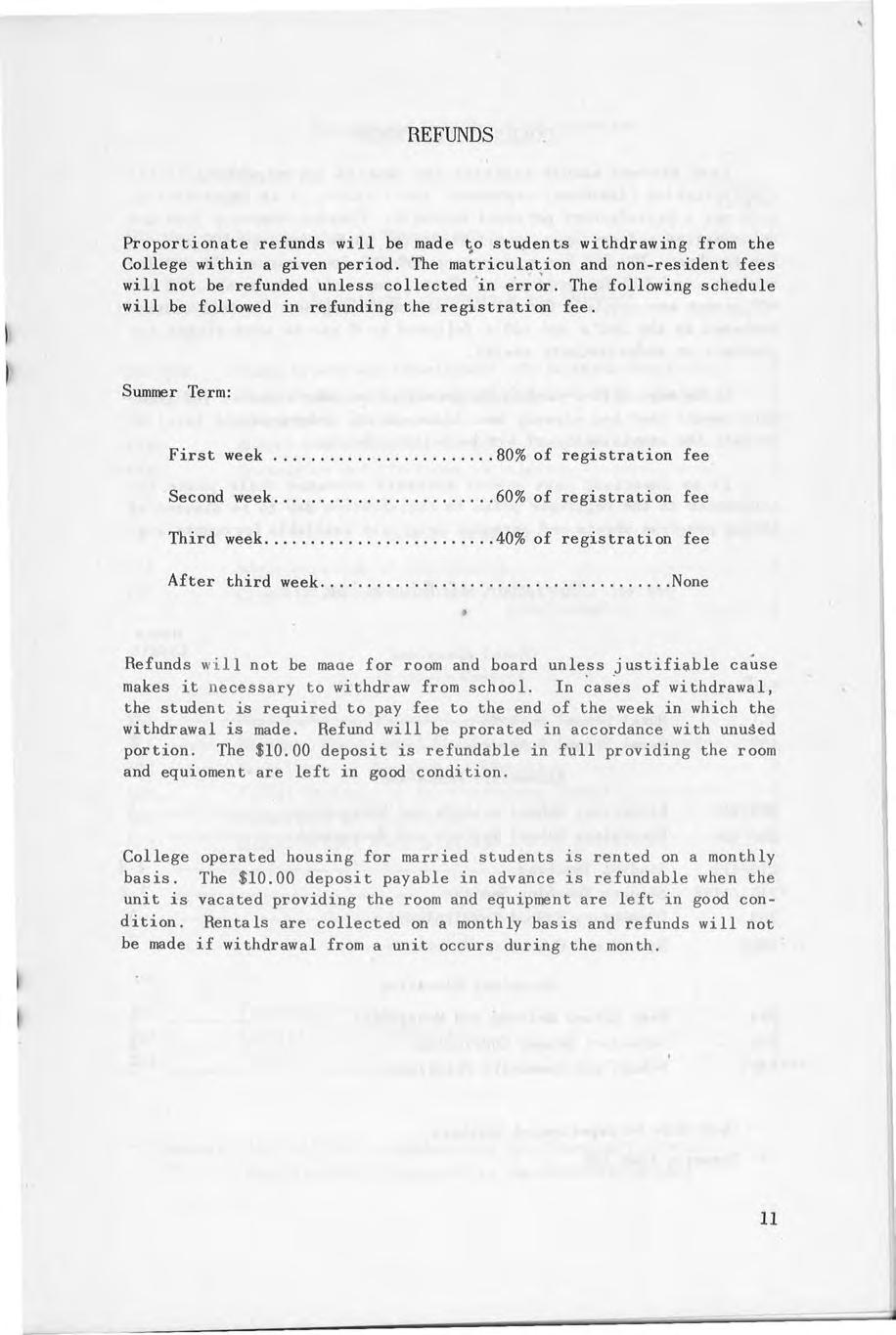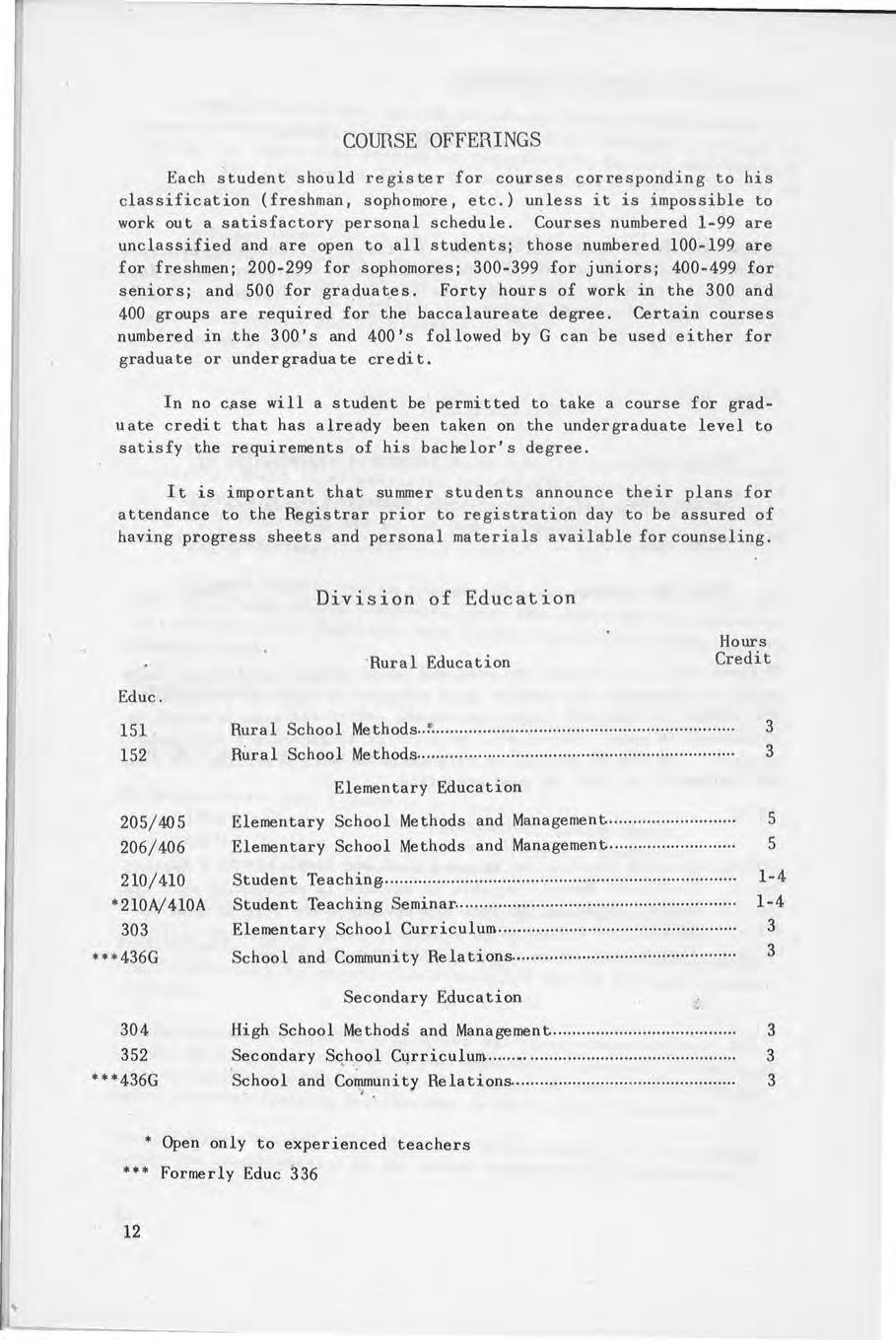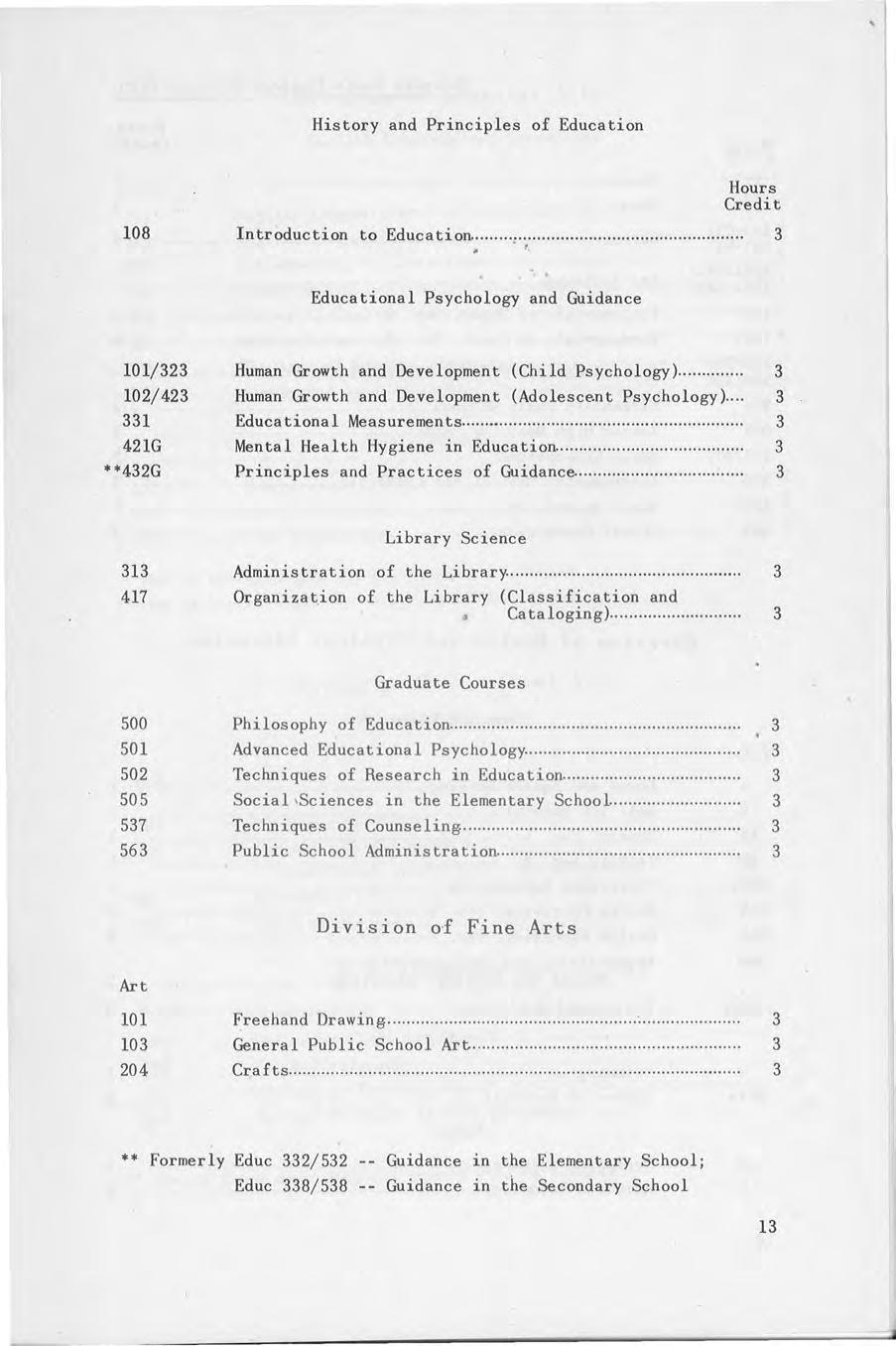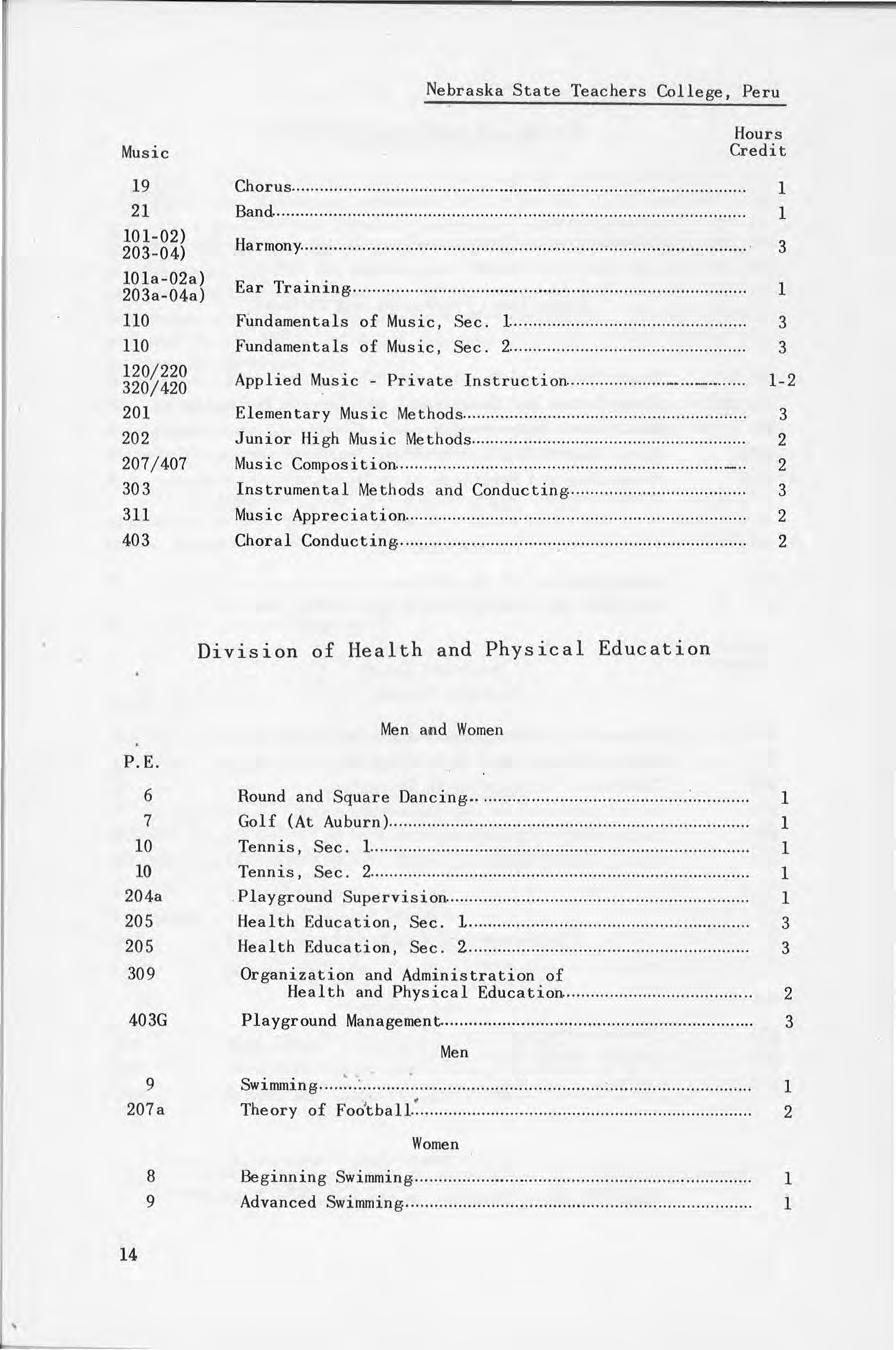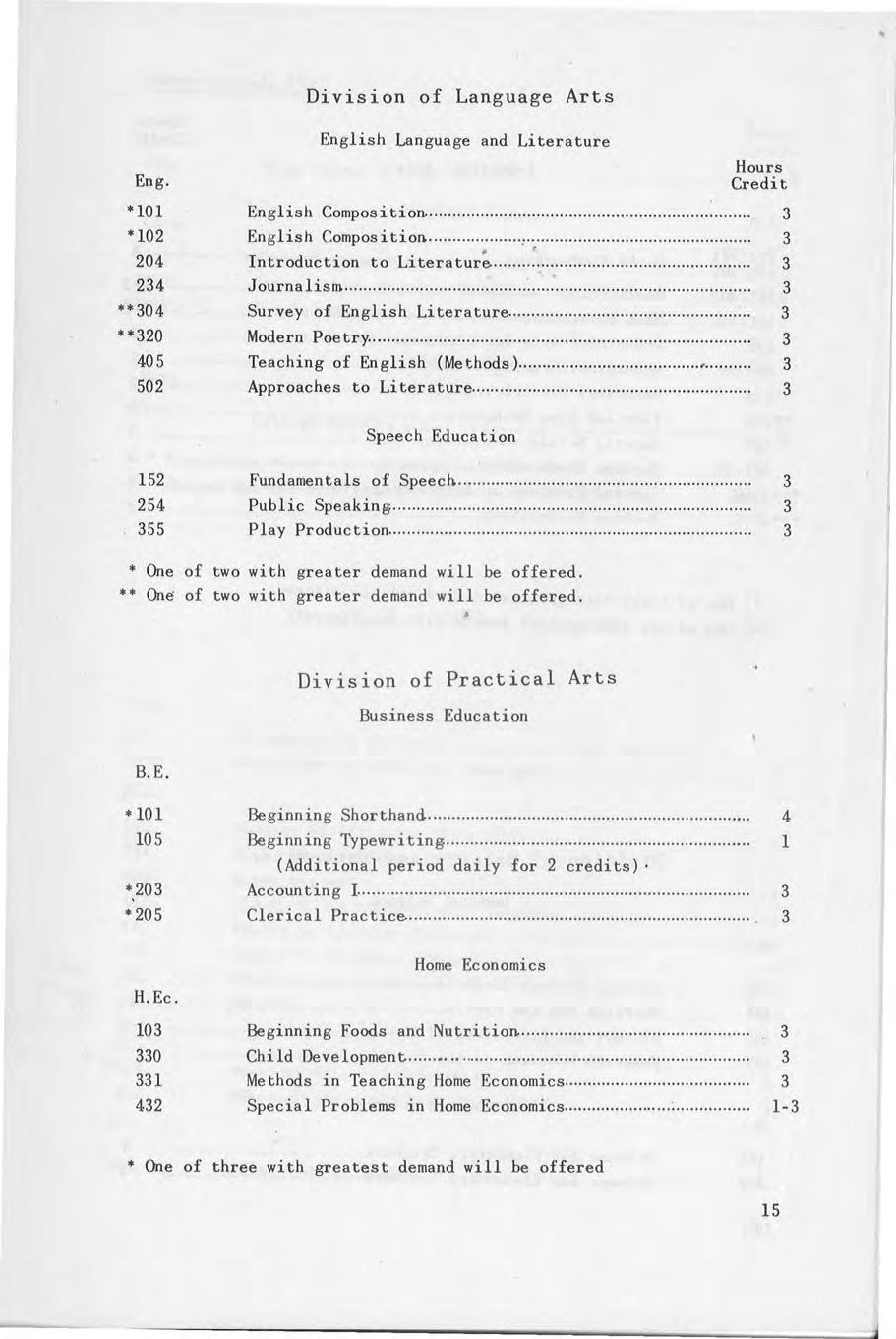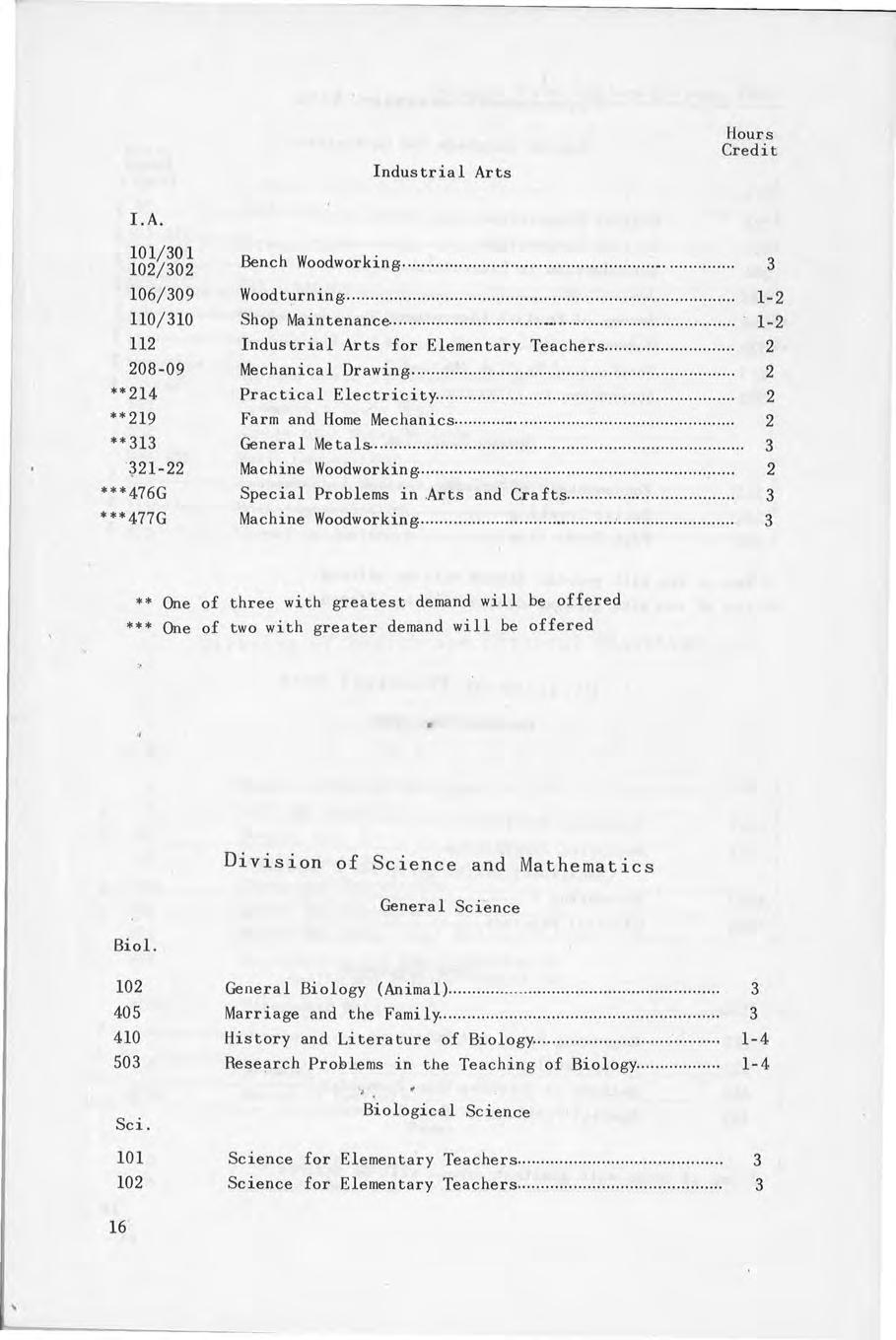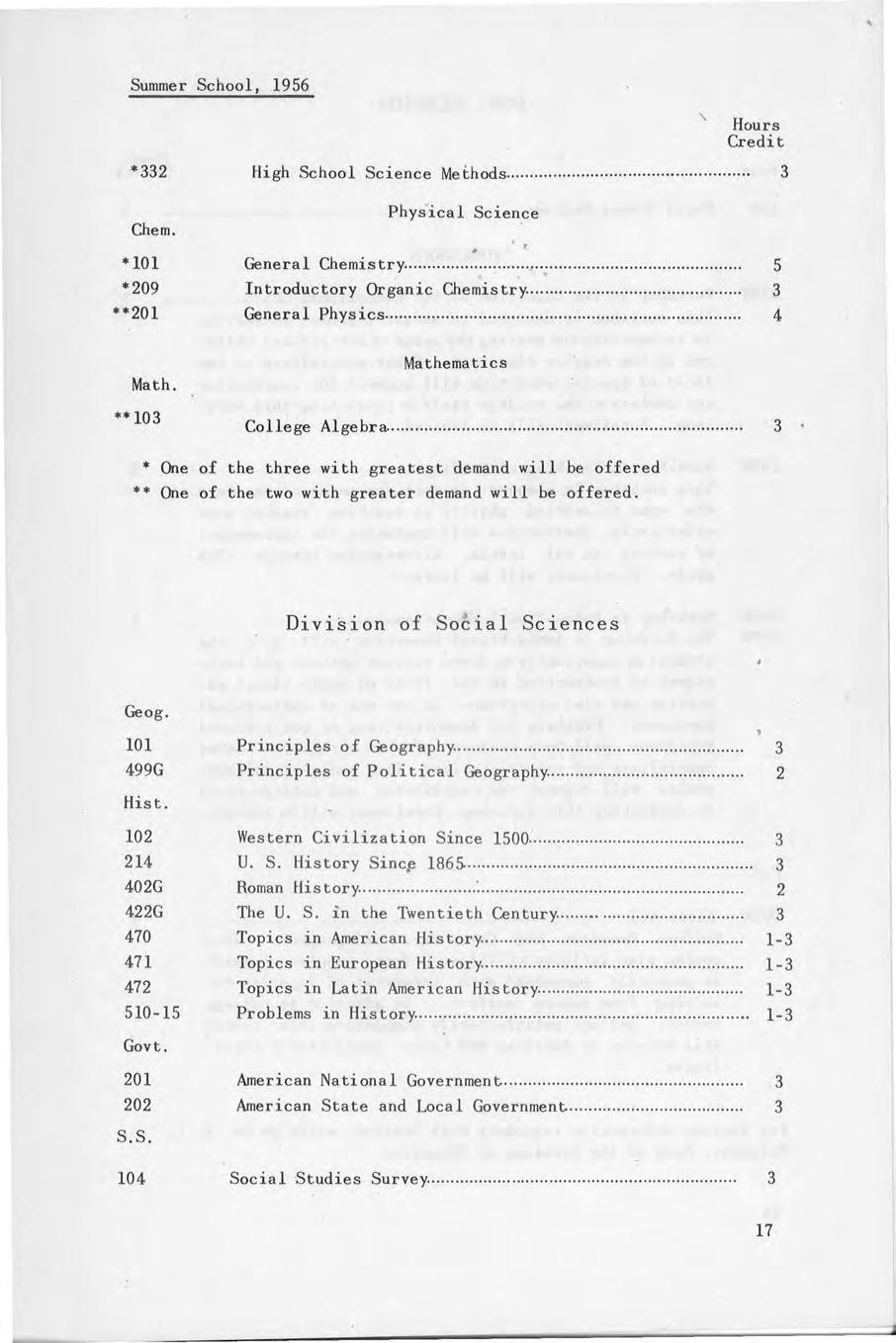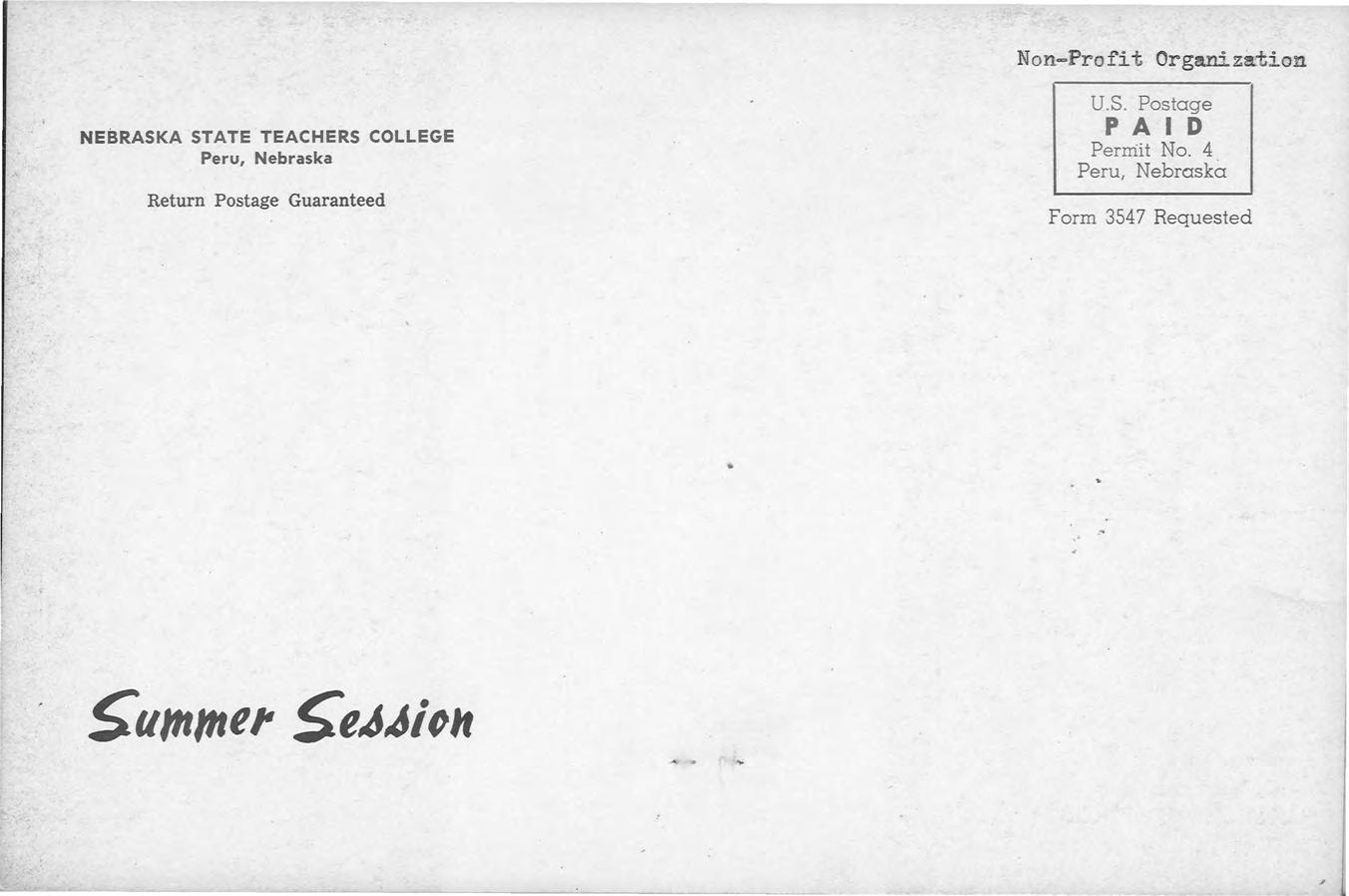Nebraska State Teachers College

Peru, Nebraska
Regular Session
June 4 - July 27
Post Session
July 28 - August 11


BOARD OF EDUCATION OF STATE NORMAL SCHOOLS

A. D. Majors ................................. Omah a
Term expires 1961
Bruce Hagemeister . ......... ... .......... Hemingford
Term expires 19 61
Bernard M. Spencer .. ...... ........... Nebraska City
Term expires 1959
Everett L. Randall ......................... Kearney
Term expires 1959
Ralph M. Carhart Wayne
Term expires 1957
Mrs. Haven Smith .......................... Chappell
Term expires 1957
Freeman Deck er, State Commissioner ......... Lincoln
Ex-Officio
E. Albin Larson, Secretary Lincoln
ADMINISTRATIVE OFFICERS
Nea l S. Gomon, Ed.D .......... ............ President
Andrew A. Weresh, Ph.D ............. Dean of College
l~rold Doraas, Ph.D .. ... ......... Dean of Students
Mar g uerite Hau ge n , M.A .............. Associate Dean of Students
F. H. Larson, M.A ........................ Registrar
Arthur Lindahl, A. D......................... Dursar
Nellie M. Carey, M.L.S Librarian
Stacy Vance ...................... Superintendent of Buildings and Grounds
HEADS OF DIVISIONS OF INSTRUCTION:
Division of Education ........ . ... Floyd L. Mullinix
Division of Fine Arts . ........ .. ... Victor H. Jindra
Division or' Health ' and Physical Education ......... . Alfred G. Wheeler
Division of Language Arts ........... Tiobert D. Moore
Division of Practical Arts ...... . ..... . A. V. Larson
Division of Science and Mathematics John C. Christ
Division of Social Sciences ........... Gordon Kenyon
LOCATION AND CAMPUS
The city of Peru (population 1260) is located at the east side of Nemaha County in the hills along the Missouri River, 75 miles southeast of Lincoln and 65 miles south of Omaha. It is situated on State Highway 67 which intersects Federal Highways 73 and 75 six miles west of Peru, five miles north of Auburn and fifteen miles south of Nebraska City.
The Peru campus of sixty acres of rolling oak-covered hills over1 ooks the Missouri River. In this setting thirteen buildings are conveniently and attractively arranged, interspersed with well-kept lawns, trees, shrubs and gardens.
THE SUMMER SCHOOL
Courses--In the main, summer school courses are the same as those given in the regular year. Many courses are repeated each summer, while others for which the demand is small are alternated and made available every second or third summer. Students planning to enter other professions or interested in terminal education will find the offerings of this college suited } o their needs.
Wor ksh ops- -Provision has.been ma de for teachers in service, administrators, a nd s upervisors to earn additional credit by participating in one of a number of workshops during the 1956 Post Session. These work shops will he offered in th e areas of Special EducatioQ, Teaching of Reading, Audio-visual Education, and First Aid. For, further information re ga rdin g these workshops see "Post Session" in this bulletin. Persons interested should write to the Head of the Division of Education. Enrollment will be limited.

Advantages--Students may continue their college work during the summer and thus shorten the time necessary to complete the requirements for a diploma or degree.
High school graduates, who wish to te ac h next fall, may earn the required 12 semester hours for the Third Grade Elementary School Certificate, Others, who do not plan to teach next fall, may start their college work in the summer just as well as in the fall.
Teachers may earn sufficient credit to renew their certificates or raise them to a higher level.
Returning veterans may continue or start their college study during the summer.
Facilities--All of the facilities of College, both educationa l and recreational, are available to the students in summer school . The air-conditioned library of 56,000 volumes is one of the finest in the state . . Through their various courses students will have access to the fully equipped laboratories, shops, and studios.
Sessions--The summer will consist of two sessions as follows : The Regular Session (8 weeks) opens on June 4, closes July 27. The Post Session (2 weeks) opens July 28, closes August 11. Students may attend either or both sessions.
Credit--Students may take 9 hours 1n the regular session, 3 hours in the post session, or a total of 12 hours by attending both sessions.
Registration--Registration will be in the Gymnasium on Monday, June 4. To divide the registration better, you are asked to observe this alphabetical division for the day:
If your surname begins with-- Please register during--
A through L Forenoon, hours 8:00 to 12:00
M through Z Afternoon, hours 1:00 to 4:00
Change of Program--A student is allowed to change his progra m of $tudies only during the first week of the regular session.
THE GRADUATE PROGRAM
Graduate courses will be available this summer to students who plan to fulfill the requirements for the Master of Arts and Master of Science in Education degrees and also to those students who simply desire to take graduate work without expectation of taking a degree. Courses will be offered in Elementary Education, Secondary Education, Public School Administration and Supervision, and Educational Psychology and Guidance. The program and the regulations regarding graduate courses are described in the Graduate Bulletin. Graduate courses available this summer are listed in the "Schedule of Classes."

. ADMISSION
Students seeking admission to the College should write to the Registrar for official forms. The forms include the Application for Admission to be prepared by the student and the standard Principal's Report and Transcript of High School Record form to be completed in
duplicate by the high school principal. These completed forms should he returned well in advance to the time of registration to facilitate arrangements before the student arrives.
Full Admission--High school graduates receive full admission to freshman standing with a minimum of 160 high school semester hours (16 units) from a four-year high school and the recommendation of the high sc.hool principal or superintende~t. Although no specific distribution of entrance units is nec~ssary it is recomm~nded that at least half of the units earned represent work in English, foreign language, mathematics, natural science, and social studies.
Conditional Admission--Students who have completed 150 high school semester hours (15 units) or the equivalent for high school graduation, are admitted to freshman standing on condition that their work proves satisfactory during the first year in college. Appropriate college courses may he recommended in f\elds where the student is deficient upon admission. Mature individuals who are not high school graduates but who are otherwise prepared and recommended for college work, may he admitted as special students. A college aptitude test and the GED (General Education Development) tests are administered in judging the individual's qualifications for admission .
Advanced Standing- - Applicants for admission from other college~, while submitting the formal application for admission, · should request their last college to send an official transcript of college work completed, including high school entrance units and evidence of dismissal in good standing. Full credit is given for work done in schools which maintain comparable standards of admission and accomplishment. In case of transfer from a junior college a maximum of 66 hours is applicable toward a degree based on 125 hours

Admission to Graduate Study--Application for Admission to Graduate Study must he submitted to the Registrar two weeks prior to registration. Students who are not graduates of Peru must submit transcripts of high school and college credit.
Academic Progress- - In terms of a student's objective such as the degree or the one and two-year diploma, credits earned should be evaluated and distributed to show progress towards that objective . The Registrar aims to prepare such a report with a copy to be shared with the student to enable him to keep a record as he advances. For the student who may not he familiar with and does not have this form of report already, a request in writing should be made to the Registrar prior to the next enrollment. This is especially important for the students who have started their college courses several years ago under some requirements quite different from the current ones.
IMPORTANT! PLEASE ADVISE AS TO YOOR ENROLlMENT PLANS IBIS SIJ.IMER.
If you will enroll this summer you are urged to use the handy mailing card with this bulletin to give appropriate advisement as early as possible. Your compliance on this card will facilitate the assembling of personal materials for advancing your registration ,
CERTIFICATES
All certificates, and renewals of certificates, are issued by the State Superintendent of Education When students have completed the requirements for a degree or diploma, they may be recommended for the type of certificate to which they are entitled . All regular certificates may be renewed by earning 9 semester hours including 2 or 3 hours in education . Students should consuit a copy of the Certification Digest at the Registrar's office or at their county superintendent's office for detailed certificate requirements and renewal requirements.

Third Grade Elementary School Certificate--For students wishing to obtain a Nebraska Third-Grade Elementary School Certificate which 1s valid in the rural s c hools a nd other Class One Schools for a period of one year, the College offers a special 12-hour pro g ram as follows:
Application for a~mission to the 12-hour program must be made in advance to the Director , pf tile Campus Sc hool. Students planning to enroll in this pro g ram must also submit evaluation s heets filled out by their principal or superintendent and two other persons, and must appear at the colle g e for tests and interviews at 9:00 a.m. on April 28.
DEGREES AND DIPLOMAS
Nebraska State Teachers College at Peru is authorized by law and the rules of the Board of Education of State Normal Schools to issue the following degrees and diplomas:
1. Degrees
A. Master of Arts in Education
B. Master of Science in Education
C. Bachelor of Arts in Education
D. Bachelor · of Science in Education
E. Bachelor of Fine Arts in Education
F. Bachelor of Arts
2. Diplomas
A. Two-Year Diploma
B. One-Year Diploma
The degree is determined by the curriculum completed by the student, the type of major and the courses in education included. Diplomas are granted only for the completion of curriculums in elementary education or rural education.
PLACEMENT BUREAU
The Placement Bureau is conducted for the purpose of helping students secure desirable positions. Graduates are not guaranteed a position, hut every effort is made to locate worthy teachers in satisfactory places. The charge for joining the Placement Bureau or for having credentials brought up to date is two dollars.

Peru also offers complete training designed to fit students for business careers. The Placement Bureau maintains close contact with business firms in cities throughout the area and makes every effort to find openings and place students in positions for which they are qualified.
STUDENT TEACH ING
A maximum of four semester hours of student teaching credit may he earned in the elementary grades by a limited number of students during the regular summer session. Student teaching assignments are
Nebraska State Teachers College, Peru
available only to those persons who will make application for a degree or a diploma from Peru. Persons desiring student teaching assignments during the summer session should write to the Director of the Campus School several weeks before registration.
Persons who can suhmi t evidence of having had at least three years of successful teaching experience may earn student teaching credit by participating in a Student Teaching Seminar. Applications for admission to Student Teaching Seminar must he make in advance to the Director of the Campus School.
ENTERTAINMENT AND RECREATION
Peru's location in the rolling, wooded country along the Missouri River offers many opportunities for hikes and outings. Other recreational opportunities include the intramural programs, music, dramatics, and social dancing. Concerts, lectures, movies, recitals, and convocation programs provide en.ioyahle occasions for summer students.
Sports--Classes are conducted in swimming and tennis for those who desire instruction in these sports. The college pool is open regularly for recreational swim periods. Two surfaced courts are maintained for instructional and recreational use. Each summer a softball le ague is formed composed of teams ·representing classes, departments, and organizations.
Band and Chorus- -Stu den ts who sing or play an instrument, regard1 ess of whether or not they are majoring or minoring in music, are invited to become a member of one or both of these groups.
Concerts--The summer concert series will feature ?utstanding talent in a variety of musical offerings.
Student Union- -Summer students will find the student union quarters a pleasant place for recreation and relaxation. The facilities include a game room with billiards, snooker, and ping pong equipment, Bob Inn Snack Bar, dance floor, lounges, TV room, and faculty room.
LIVING ACCQ~ODATJONS AND DINING SERVICE
All requests for information concerning living accomodations and requests for room reservations in one of the residence halls should he directed to either the Dean of Students (men) or the Associate Dean of Students (women) . Students having radios in their rooms must use transformers since the electric current on the campus is 220 volt, a. c.

Residence Halls--The college residence halls offer attractive living accomodations near the classrooms and library. Halls are maintained for both men and women students.
Women--Eliza Morgan Hall for women is under the supervision of the Associate Dean of Students. Two students 'occupy a room. All rooms are arranged as combination s leepin g and study rooms. Residents of the hall must furnish bed linen, blankets • , tow~ ls, dresser scarfs, and curtains.
Men- -Delzell and Mt. Vernon Halls provide superior facilities for men of the college. They are under the supervision of the Dean of Students. All rooms are arranged as combination sleeping and study rooms. Two students occupy a room. Residents of the halls furnish bed linen, blankets, and towels.
Married Students--One, two, and three-bedroom apartments are available at low cost to marri ed students in Married Student Housing. Complete information may be obtained by writing to the Bursar.
Dining Services--The air-conditioned college dining room is located in Mount Vernon Hall and is open to all students. Students in any of the residence halls receiv~ their meals in accordance with the option chosen as l i, ted below. Drive-in students and others may purchase meals at a low rate. The Bob Inn Snack Bar will be open for lunches and snacks at stated hours.
BOARD AND ROOM CHARGES
Eight-Week Session
Option One--Board and Room (5 day week) $ 96.00
(All meals Monday through Friday except Friday supper)
Option Two --Boar d and Room (7 day week) $120.00
(All meals except Friday supper and Sunday breakfast)

Post Session
Board and Room ( 7 day week) $ 35. 00
(All meals except Sunday breakfast)
All rates apply when two students occupy a room. For single occupancy, when available add $15.00 for eight week session and $5.00 for post session.
Nebraska State Teac hers College, Peru
Room and board are due and payable at time of registration. By specia l arrangement with the Bursar students may pay one-half of charge for eight-week session on registration day and remainder on July 2. The full amount for post session is due on the first day of the sessJ.on
Required Deposit--A deposit of $20.00 is required of each student applying for a reservation in any of the halls. After a room is occupied, $10. 00 wi 11 be applied on board and room charges, the remainder ($10.00) is retained as a deposit against mis-use of equipment. No request for reservation will be honored unless deposit accompanies request.
FEES AND TUITION
Tuition charges are payable in cash at the time the student registers. There is no provision for carrying a student on a credit or accounts receivable basis. Every student should arrange to have sufficient funds with him at the time he registers with which to pay his tuition in full.
Students registering in courses bearing graduate credit pay the same fee as undergraduate students, with the exception of a variation in textbook costs. Textbooks must be purchased for courses bear ing graduate credit.
(The single fee includes registration, student union, health, college paper, laboratory, library, course and contingent fees, and locker rental.)
Matriculation- -Paid but once by each student entering college.. 5. 00

Applied Music--No charge for private instruction for students majoring or minoring in music; for · others the charge for each lesson is$1.50.
Non-Resident--Non-Resident students will pay a non-resident Jee, minimum $5.00 and maximu~ $10.00 per semester, in addition to the fees paid by residents of Neb~aska. ,Fee is based on non~resident charges made in teacher-training i~stitutions in the student's home state.
Scholarships--Nebraska Normal School scholarships will be honored during the summer session in the amount indicated in the scholarship.

